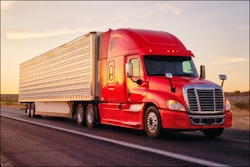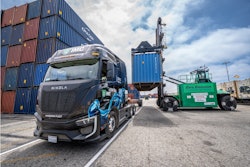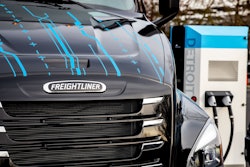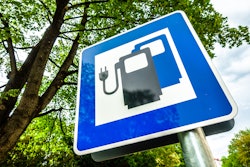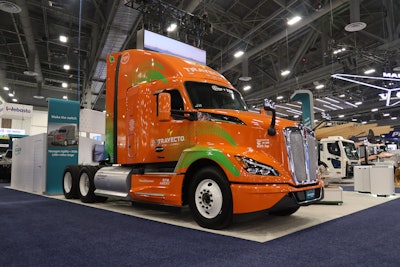
As the trucking industry’s decarbonization efforts continue with a major focus on developing battery-electric and hydrogen fuel cell technologies, natural gas - specifically renewable natural gas (RNG) - continues to increase in popularity in both production and fleet usage.
RNG, also known as biomethane, is a carbon-negative biogas that has been upgraded to be similar in quality to fossil natural gas. It's sourced from municipal solid waste landfills, livestock, wastewater treatment plants, and food production facilities, among others.
The production process consists of removing carbon dioxide from biogas and increasing the methane concentration to a comparable level to that of fossil natural gas. This results in RNG’s ability to be distributed through existing gas pipelines and natural gas fueling stations. RNG is also compatible with vehicles that already have natural gas engines.
When sourced domestically, natural gas vehicles (NGVs) fueled by RNG are more cost effective and meet efficiency requirements for the EPA Clean Trucks Plan. It’s a win-win.
Fleet operators, OEMs, and many equipment manufacturers have taken notice.
Immediately decarbonize
Speaking to Clean Trucking at the 2024 ACT Expo, Hexagon Agility Vice President of North American Sales Ian MacDonald emphasized that RNG could be the solution for fleets aiming to immediately begin decarbonization.
“If you’re using something like a gas generated from the landfill then it’s extremely low carbon. Any form of RNG is the most friendly and most compelling carbon reduction strategy you could have," MacDonald said. “RNG and CNG (Compressed Natural Gas) are completely interchangeable. So you could be running a fleet of trucks, buy a traditional CNG and then make the decision to start using RNG to power the truck then everything is the same. You can just flip the switch to RNG.”
[Related: Kenworth announces production schedule for Cummins X15N-equipped trucks]
Hexagon Agility specializes in CNG and RNG fuel systems. A Kenworth T680 natural gas truck with the new Cummins X15N natural gas engine, displayed at the Hexagon Agility booth, was equipped with the company’s fuel system that can deliver up to a 265-diesel gallon equivalent (DGE). Hexagon Agility's Bio LNG Cyroshelter fuel tank can provide greater range than bio compressed natural gas.Clean Trucking
Hexagon Agility's Bio LNG Cyroshelter fuel tank can provide greater range than bio compressed natural gas.Clean Trucking
MacDonald added that 100,000 trucks currently use the company's natural gas fuel systems. OEMs such as Kenworth and Peterbilt ship trucks to Hexagon Agility specifically to have natural gas fuel systems installed prior to customer delivery. General goods semi-trucks and refuse trucks are typically the most common to run on CNG/RNG.
RNG increase means more supply, cost savings
NGV operators don’t have to invest time and money converting their vehicles because RNG is already interchangeable with NG in compressed or liquefied form. More than half of the country’s natural gas refueling stations already only supply RNG.
According to the recently released 2024 State of Sustainable Fleets Report, RNG producers opened over 150 new facilities in 2023, leading to “a record year in which 91% of new natural gas projects generated RNG with another 175 projects expected to come on-line” by year’s end.
Nationwide, there are currently 311 RNG production facilities in operation and another 489 are in the planning stages or under construction.
Interestingly, the report’s survey data found that less than half of fleets operating NGVs last year fueled them with RNG. But on the flip side, fleets who bought RNG used more of it on average than in 2022. This trend is expected to continue.
Natural gas prices, in general, increased last year but they still remained competitive against diesel on a dollar per diesel gallon equivalent (DGE). Average annual retail prices rose 11% from $2.73/DGE to $3.04/DGE. Private prices, meanwhile, showed a slightly larger 13% increase from $2.36/DGE to $2.66/DGE. Natural gas prices are expected to remain stable and competitive compared to diesel.
On average, fleets fueling on NG paid 50% less than the DGE in 2023.
As such, demand and deliveries for NGVs continues, especially for refuse and general freight fleets. Transit deliveries, however, experienced a demand decline but this was partially offset by increased NGV school bus deliveries.
RNG’s carbon intensity creates incentives
Natural gas is already a clean fuel and it’s becoming even cleaner. California Air Resources Board (CARB) data from 2023 indicated that the average carbon intensity (CI) of the bio-CNG mix sold in the state beginning in spring 2023 dropped to the lowest CI level for “any transportation fuel or technology in the state.” RNG, understandably, has become the natural gas of choice in the Golden State.
"We're seeing rapid acceptance of RNG," MacDonald continued. "In California, it's around 99% of the transport. The incentives for RNG in California are quite strong. Nationwide, it's approaching 70% of the total usage."
If passed, the 2024 Renewable Gas Incentives Act would provide a $1.00 tax credit for motor vehicles that use renewable natural gas to further support cleaner and more efficient transportation.
Natural gas meets battery electric
Hexagon Agility recently expanded into Near-Zero Emissions Vehicles (NZEV) by joining forces with Brudeli Green Mobility, an electric transmission technology company from Norway. The collaboration will see Hexagon's RNG/CNG systems integrated with Brudeli's plug-in powered hybrid technology. The dual-electric motor system allows for long-haul trucks to operate up to 80% electric energy.
Fleets will maintain diesel-like duty cycles, achieve fuel cost savings, hit decarbonization marks, and comply with federal and state emission standards.
“Our partnership with Hexagon enables fleets in hard-to-electrify market segments to achieve zero-emission operation in sensitive areas, while eliminating range anxiety for longer trips with RNG,” said Brudeli CEO Lasse Bjørkhaug. “Additionally, fleet operators will benefit from trucks that offer superior electric-like performance without the same payload restrictions.”
Pilot truck introduction kicks off in 2026 ahead of a 2028 market launch.




